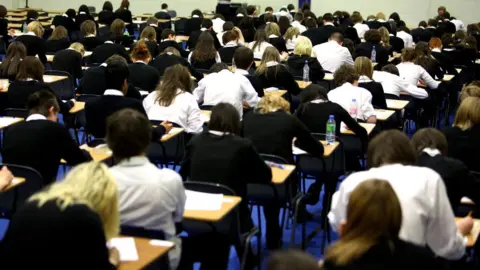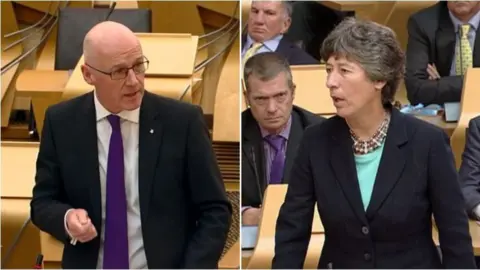MSPs call for 'urgent action' over school subject choice
 Getty Images
Getty ImagesMSPs have voted to recognise "serious concerns" about "fundamental failings" around subject choice in schools.
More than half of the pupils who responded to a Holyrood survey said they were not able to take all of the subjects they wanted to at school.
And opposition members defeated the government to call for "urgent action" after a debate on Wednesday.
Education Secretary John Swinney said a wide range of subjects was available, and that exam passes were on the up.
But all four opposition parties united to reject his amendment and pass the Conservative motion for the debate.
The Scottish Parliament's education committee is conducting an inquiry into whether teenagers have a wide enough choice of subjects in school, amid claims this may be narrowing.
A recent report by the Reform Scotland think-tank said there had been a "sharp reduction" in subjects available at National 4 and 5 level.
And the committee has now released the results of its own surveys on the subject - although because they were conducted online and were self-selecting, they are not necessarily representative of all pupils and parents across the country.
 Getty
Getty A total of 241 pupils and 375 parents took part in the surveys. Of these, 56% of the pupils who responded said they had not been able to take all of the subjects they wanted to, while 76% of parents said this had been the case with their children.
The parents who responded highlighted music as the subject most likely to be missed out on, while pupils complained most frequently about not being able to take modern studies.
The most common reasons cited for classes not being available were:
- timetable clashes - where only one class was available
- pupils being in other subjects at the time
- staff shortages
- and schools not offering the subjects in question.
'Useless subjects'
One pupil said they were not allowed to take modern studies, so "had to take art instead, which I hated", while another said they were "forced to take Spanish, a course I have no interest in, and miss a class I really enjoy".
Another wrote that the range of choice "led me to take useless subjects as filler for my timetable, which led to a lot of wasted time".
Parliament researchers highlighted that a number of pupils expressed concerns that subject choice could impact on their future, with one saying "I might not be able to take the subjects I need to get to university".
The Scottish government has insisted that Curriculum for Excellence offers "significant flexibility" for schools to "design a bespoke three-year senior phase of courses and qualifications".

The motion passed by MSPs calls for "urgent action" to address "fundamental failings with regard to subject choice, including the inequity that exists between schools in more affluent areas and those in more deprived communities". It is not binding on the government.
Scottish Conservative education spokeswoman Liz Smith said while nobody would expect every pupil to be able to take every single subject they wanted, "this survey shows more than half of pupils are denied this opportunity".
She said: "That speaks volumes about the narrowing choice of subjects being offered to Scotland's pupils under this SNP government.
"Scotland used to be world-renowned for the breadth of education on offer in school. Now it's more likely than not that our children will be denied the opportunities for learning they both need and deserve."
'Tolerate distinction'
Mr Swinney told MSPs that the Curriculum for Excellence was designed to "empower schools" - and that to have such a system, "we will have to be prepared to tolerate distinction and difference between schools".
He said the curriculum had created a broad general education where pupils have the opportunity to study subjects to a deeper level for a longer period.
The education secretary insisted this was leading to better outcomes, with more pupils going on to positive destinations and more achieving qualifications.
First Minister Nicola Sturgeon was also asked about subject choice at her weekly Holyrood question session last week, and insisted that the education system was "performing well".
She said that "our focus must be on the whole school experience, the range of qualifications that are achieved and the destinations of young people when they leave school".
